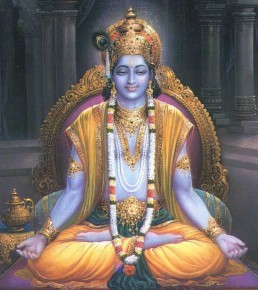Commentary
Arjuna confesses that his confusions have ended as if he were woken up from a state of unconsciousness. This statement of Arjuna is not a mere meek acceptance of the arguments of Sri Krishna.
It is an affirmation of re-gaining and re-cognizing his own real nature on account of the awakening of the hero in him as well as his confirmation that the neurosis which conquered his mental make up temporarily has vanished. The awakening of wisdom is the end of ignorance. In this state all vacillations of the mind, doubts and despairs, dejections and hesitations, fears and weaknesses disappear.
With such a rejuvenated mind Arjuna declares that he will do according to the word of The Lord who is nothing but Pure Existence. This is the surrendering of oneself to one’s own inner personality. To surrender oneself and declare that he would do The Lord’s bidding is the beginning and the end of all spiritual life. There is no more sense of separate existence for the declarer apart from the Godhead. This evolution means shedding of all pretences and evasions.
‘Arjuna turns to his appointed action, not with an egoistic mind but with Self- Knowledge. His illusions are destroyed, his doubts are dispelled. The chosen instrument of God takes up the duty set before it by The Lord of the world. He will now do God’s bidding. He realizes that He made us for His ends, not our own. Arjuna had the onset of temptation and won his way to a liberating victory. He now feels that he will fulfill the command of The Lord. It is our duty to live in the spirit of this verse and remember that we seek not our own will but the will of Him who sent us. To will what God wills is the secret of Divine Life’. Dr. S. Radhakrishnan.
When Arjuna uttered the words ‘karishye vachanam tava’ (‘thy will be done’ as a Westerner would say) he gave up his separate existence and identified himself with the work of the Lord. This evolution means a great shedding of all pretences, assumptions and evasions. It is a kind of vastrapaharana, a stripping-off of the mind and intellect.
Swami Chinmayananda
Swami Chinmayananda Commentary
The commentary on this verse and the rest, is avaialble for free as:
Kindle eBook
Google Play Book
Apple Books
Adi Sankara Commentary
O Acyuta, (my) mohah, born of ignorance and the cause of all evil in the form of mundane existence, and difficult to cross like an ocean;l nastah has been destroyed. And smrtih, memory, regarding the reality of the Self-on the acquisition of which follows the loosening of all the bonds; labdha, has been regained, tvat-prasadat, through Your grace maya, by me, who am dependent on Your grace. By this question about the destruction of delusion and the answer to it, it becomes conclusively revealed that the fruit derived from understanding the import of the entire Scripture is this much alone-which is the destruction of delusion arising from ignorance and the regaining of the memory about the Self. And similarly, in the Upanisadic text beginning with ‘I grieve because I am not a knower of the Self’ (Ch. 7.1.3), it is shown that all bonds become destroyed when the Self is realized. There are also the words of the Upanisadic verses, ‘The knot of the heart gets untied’ (Mu. 2.2.8); ‘at that time (or to that Self) what delusion and what sorrow can there be for that seer of oneness?’ (Is.7). Now then, sthitah, asmi, I stand under Your command; gata- sandehah, with (my) doubts removed. Karisye, I shall follow; tava, Your; vacanam, instruction. By Your grace I have achieved the goal of life. The idea is, there is no duty, as such, for me. The teaching of the Scripture is concluded. There-after, now in order to show the connection (of this) with the (main) narrative-.
The Bhagavad Gita with the commentary of Sri Sankaracharya – Translated by Alladi Mahadeva Sastry
Holy Geeta – Commentary by Swami Chinmayananda
The Bhagavad Gita by Eknath Easwaran – Best selling translation of the Bhagavad Gita
The Bhagavad Gita – Translation and Commentary by Swami Sivananda
Bhagavad Gita – Translation and Commentary by Bhaktivedanta Swami Prabupadha
Srimad Bhagavad Gita Chapter 18 – Verse 73 – 18.73 nasto mohah – All Bhagavad Gita (Geeta) Verses in Sanskrit, English, Transliteration, Word Meaning, Translation, Audio, Shankara Bhashya, Adi Sankaracharya Commentary and Links to Videos by Swami Chinmayananda and others – 18-73

